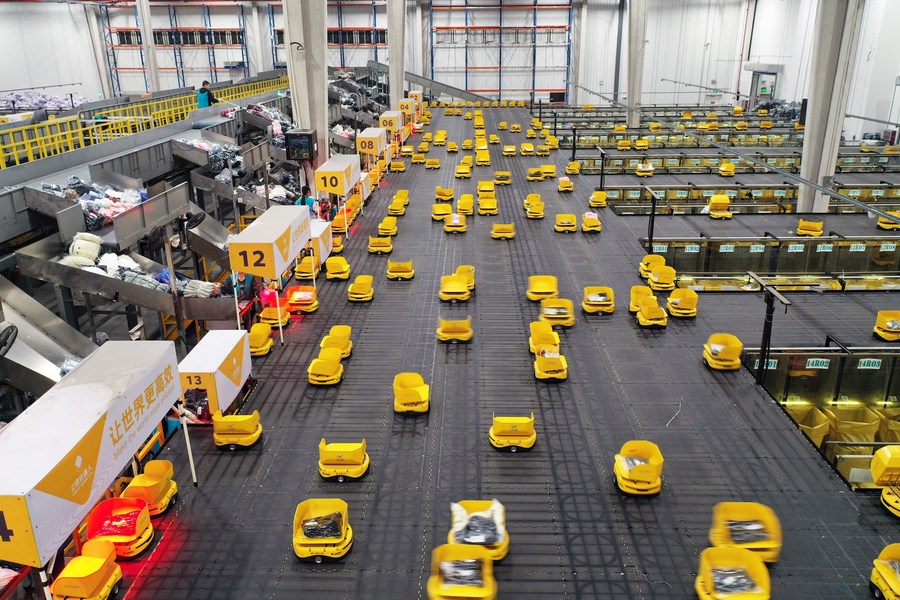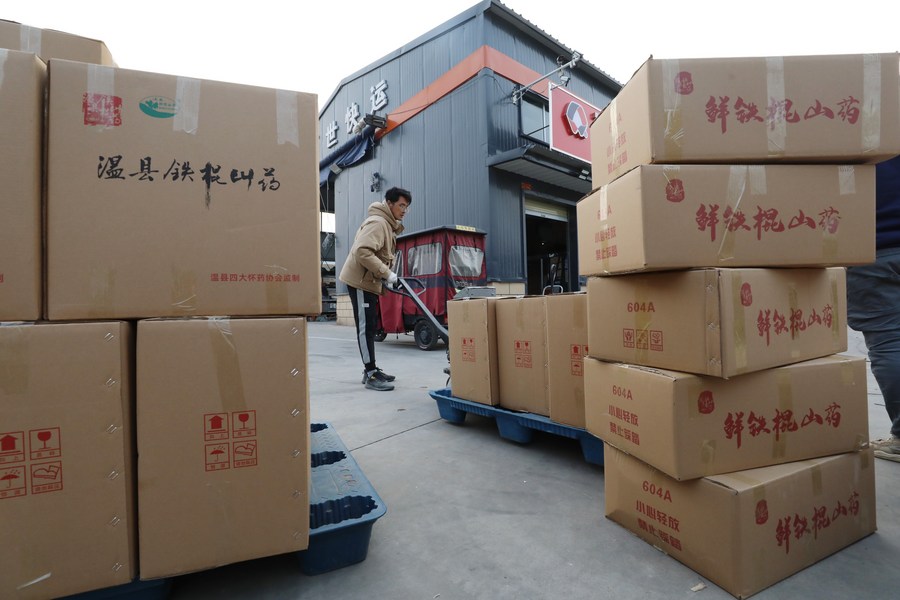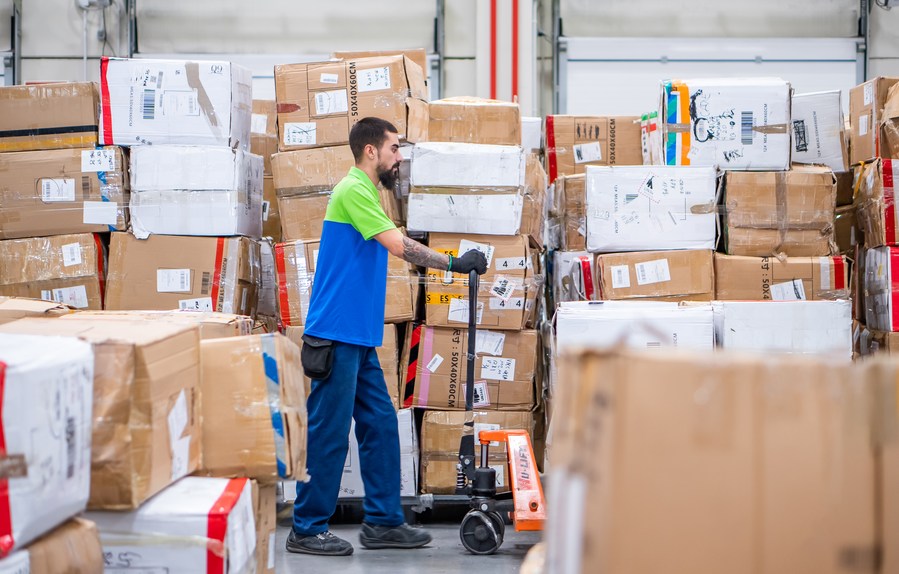Improved logistics spur global market in "Double 11" shopping festival
LANZHOU, Nov. 12 (Xinhua) -- Zhao Shuting, a resident of Changchun, northeast China's Jilin Province, received her first delivery about half an hour after placing her order on Alibaba's Tmall platform on the evening of Oct. 31, the first day of the roughly two-week-long "Double 11" online shopping festival, which ran until Saturday.
Zhao was excited to discover that many people had similar experiences, and the question "Why is the 'Double 11' delivery so fast" became a popular topic on social media.

This aerial photo taken on Nov. 8, 2023 shows robots sorting and conveying parcels at an intelligent logistics center in Deqing County, east China's Zhejiang Province. (Photo by Ni Lifang/Xinhua)
LOGISTICS EVOLUTION
The secret of the extraordinary efficiency may lie in some pilot arrangements in the courier service sector.
Thanks to the pre-sale system of online shopping, which means customers will pay a deposit before the festival's commencement, a batch of parcels had been delivered in advance to numerous courier service outlets.
"After the full payment, the purchase would only take a few minutes to be delivered to the consumers in the surrounding communities, and most packages can be delivered within half a day," said Liu Yu, a courier station chief in Yuhang District of Hangzhou, capital of east China's Zhejiang Province.
According to Yang Daqing, a logistics industry expert, the pre-sale pattern, which has tremendously improved the consumer experience, highlights the intelligent transformation of the industrial supply chain.
Improvements in various sectors, including manufacturing, intelligent collaboration, and transportation infrastructures, have helped reduce delivery time.
One of the latest progresses is the launch of a major smart logistic center built by e-commerce giant JD.com in northwest China's Gansu Province. Thanks to fully automated sorting, the 200,000-square-meter new facility could increase efficiency by three to five times.
"This year's 'Double 11' shows many new features, such as the application of artificial intelligence, big data, and other technologies to make shopping more convenient," said Liu Yingkui, vice president of the Academy of China Council for the Promotion of International Trade, adding that the high efficiency in logistics has further boosted consumption.
As of Saturday midnight, 402 brands on Tmall reported their individual sales exceeded 100 million yuan (about 13.7 million U.S. dollars), while JD.com announced that more than 60 brands saw their respective sales topping 1 billion yuan.

A worker arranges yam products at an express delivery company in Wenxian County of Jiaozuo, central China's Henan Province, Nov. 11, 2023. (Photo by Xu Hongxing/Xinhua)
REACHING REMOTE REGIONS
Logistics capacity improvement in rural areas has enabled agricultural products to be swiftly delivered from once remote places.
In the past, Liang Qianjuan, owner of an e-commerce company in Gansu's Longnan city, had to go to the county seat to send the parcels.
The logistics costs were high, and many agricultural products in long-distance transportation would start to rot, said Liang, who has been in the e-commerce industry for 10 years.
Longnan has improved rural logistics infrastructure in recent years with a three-level logistics system, featuring nine county and district-level unified distribution centers, 199 township service stations, and 2,404 village-level service points.
As a result, the typical delivery time has been reduced from six or seven days to two or three days in the rural region.
Liang is confident she will see a new sales record in this year's "Double 11," especially with her new product -- honey glazed walnuts.
Buying rural products online from their origins has become a common practice.
During this year's "Double 11", Zhang Linlin, a Beijing resident, purchased sweet potatoes from Shandong Province, guavas from Fujian Province in east China, and mushrooms from Yunnan Province in the southwest.
"It has become my habit to make the best use of 'Double 11' to buy agricultural products. I want to try local specialties," said Zhang.

A staff member works at a warehouse of Cainiao in Madrid, Spain, Nov. 9, 2023. (Xinhua)
SHARED FESTIVAL
China's "Double 11" shopping festival began in 2009 and has grown into one of the world's largest, with an increasing number of participating retailers and consumers globally.
Zaiceva Maria Yurievna, a Russian customer living in Moscow, has purchased a mobile phone, a rice cooker, and a stereo from China via cross-border e-commerce during this "Double 11."
"I had a coupon, and the purchases were one-third cheaper than usual," she said. "My friends and I had a great time at the shopping festival."
The rapid development of international logistics and cross-border e-commerce in China has also made the "Double 11" a shared festival for overseas consumers.
"Overseas buyers choose China's electronic products and general merchandise, and, in this year's festival, our company processed more than 3 million parcels worth around 1.5 billion yuan," said Zhang Fengyuan, general manager of Hunchun Changda Electronic Commerce Co., Ltd. of Jilin Province.
"Great logistics efficiency is vital for consumer loyalty," Zhang added.
In September, leading cross-border e-commerce logistics service providers Cainiao and AliExpress launched a "five-day global delivery" service in Britain, Spain, the Netherlands, Belgium, and the Republic of Korea, which means that consumers from these countries can get orders from China within five working days.
Niu Zhijing, vice president of Cainiao, said that while the "Double 11" order volume surges, Cainiao will try to ensure that logistics efficiency is not compromised.
According to a report released by the China Internet Network Information Center in August, China's cross-border e-commerce imports and exports increased from less than one percent of total foreign trade five years ago to about five percent now, with more than 100,000 cross-border e-commerce entities.
In East Africa, a Kenya-based e-commerce platform Kilimall founded in 2014 has become the top-ranked e-commerce app in the region.
In order to reduce costs and increase efficiency, the team explored what it calls an "African overseas warehouse" business model. Under this model, Chinese merchants send their products to warehouses in African countries before local consumers place their orders, enabling buyers to receive their purchases as quickly as possible.
Its next-day delivery rate has reached 82 percent, and its successful delivery rate has reached 98 percent. Kilimall delivery workers can now be seen from the Masai Mara National Reserve to the shores of Lake Victoria.
Photos
Related Stories
Copyright © 2023 People's Daily Online. All Rights Reserved.









